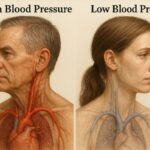High blood pressure, also known as hypertension, is caused by a number of factors. They may be grouped into lifestyle related factors, medical factors, and non-changeable factors. Here are they with possible solutions.
Lifestyle factors
Not enough physical activity
Regular exercise can help to lower blood pressure by improving the function of the heart and blood vessels, reducing inflammation, and improving the sensitivity of cells to insulin. Inactivity, on the other hand, can lead to an increase in blood pressure by causing the heart to work harder to pump blood and by promoting the buildup of fatty deposits in the blood vessels. This, in turn, can increase the risk of developing hypertension and increase the likelihood of related health problems, such as heart disease and stroke.
Solution
To maintain healthy blood pressure levels, it is recommended to engage in regular physical activity, such as brisk walking, cycling, or jogging, for at least 30 minutes a day, most days of the week.
Excessive alcohol consumption
Excessive alcohol consumption can have a significant impact on blood pressure. Alcohol can cause an immediate increase in blood pressure by stimulating the release of stress hormones and narrowing the blood vessels. In the long term, heavy alcohol consumption can lead to a sustained increase in blood pressure by causing damage to the heart and blood vessels, as well as impairing the function of hormones that regulate blood pressure. Additionally, alcohol is high in calories, which can lead to weight gain and increase the risk of obesity, another major risk factor for high blood pressure.
Solution
To maintain healthy blood pressure levels, it is recommended to limit alcohol consumption to moderate amounts, as traditionally defined by most health organizations as one drink per day for women and two drinks per day for men. However, in the recent years this difference merges down to one drink per day for both genders, some health authorities claim that any amount of alcohol places you at risk of developing hypertension.
Having stress
Stress can have a direct effect on blood pressure by causing a short-term increase in heart rate and blood pressure. This occurs as a result of the release of stress hormones, such as adrenaline and cortisol, which stimulate the sympathetic nervous system and cause the blood vessels to narrow and the heart to beat faster. This is known as the “fight or flight” response and is a normal physiological reaction to stress. However, chronic stress can have a lasting effect on blood pressure by causing sustained elevation in cortisol levels, which can lead to increased inflammation, insulin resistance, and changes in hormones that regulate blood pressure. Over time, these effects can contribute to the development of hypertension and increase the risk of related health problems.
Solution
It is important to manage stress through techniques such as exercise, mindfulness, and relaxation, to maintain healthy blood pressure levels.
Wrong eating habits
- Consuming high amounts of salt/sodium
- Eating processed, packaged and fast foods
- High intake of saturated and trans fats
- Limited intake of fruits and vegetables
- Consuming excessive amounts of alcohol
- Excessive calorie intake leading to obesity
Solution
Overweight
Being overweight or obese can lead to an increased risk of high blood pressure (hypertension). Excess body fat, especially around the waist, can increase the workload of the heart and blood vessels, causing an increase in blood pressure. Additionally, carrying excess weight can lead to insulin resistance, inflammation, and changes in hormones that regulate blood pressure, all of which can contribute to the development of hypertension. Oxygen and nutrients must be delivered to your tissues with more blood flow as you gain weight. The pressure inside your arteries increases as blood volume circulates through your blood vessels.
Solution
Loose weight, exercise regularly, eat a healthy diet, reduce intake of salt, limit alcohol consumption, stop smoking
Medical factors
Some health conditions
Chronic diseases that are associated with an increased risk of developing high blood pressure (hypertension) include:
- Diabetes
- Chronic kidney disease
- Sleep apnea
- Obesity
- Adrenal gland disorders
- Cardiovascular disease
- Liver disease
Examples of solutions
If high blood pressure is caused by diabetes, there are several steps you can take to help lower your blood pressure:
- Manage your blood sugar levels: Keeping your blood sugar levels within a target range, as prescribed by your healthcare provider, can help to reduce the impact of diabetes on your blood pressure.
- Exercise regularly: Regular physical activity, such as brisk walking, cycling, or jogging, can help to improve insulin sensitivity and lower blood pressure. Aim for at least 30 minutes of moderate-intensity exercise most days of the week.
- Eat a healthy diet: A diet rich in fruits, vegetables, whole grains, and lean protein, and low in salt, added sugars, and unhealthy fats, can help to lower blood pressure, manage diabetes, and support overall health.
- Reduce sodium intake: Limiting your intake of sodium can help to reduce blood pressure, as high levels of salt in the diet can cause fluid retention and increase blood pressure. Aim for a maximum of 2,300 milligrams of sodium per day.
- Limit alcohol consumption: Drinking excessive amounts of alcohol can raise blood pressure and increase the risk of related health problems. Limit alcohol consumption to moderate amounts, as defined by most health organizations as one drink per day for women and two drinks per day for men.
- Stop smoking: Smoking is a major risk factor for high blood pressure and can worsen the effects of other risk factors, such as diabetes. Quitting smoking can help to lower blood pressure and reduce the risk of related health problems.
- Take medications as prescribed: If your blood pressure is not adequately controlled through lifestyle changes, your healthcare provider may prescribe medication to help lower your blood pressure. It is important to take these medications as directed and attend regular follow-up appointments to monitor your blood pressure and adjust treatment if necessary.
If you have sleep apnea, there are at least two steps you can take to help lower your blood pressure:
- Treat sleep apnea: The most effective way to lower blood pressure related to sleep apnea is to effectively treat the sleep apnea itself. This may involve using a continuous positive airway pressure (CPAP) machine or other forms of sleep apnea treatment, such as an oral appliance or lifestyle changes.
- Lose weight: Being overweight or obese is a risk factor for both sleep apnea and high blood pressure. Losing weight can help to reduce the workload on your heart and blood vessels, leading to a decrease in blood pressure.
Certain medications
- Non-steroidal anti-inflammatory drugs (NSAIDs): such as ibuprofen and naproxen
- Decongestants: often found in cold and allergy medicines
- Hormonal contraceptives: birth control pills, patches, injections, and some forms of intrauterine devices (IUDs)
- Corticosteroids: used to treat inflammation and autoimmune conditions
- Adrenergic bronchodilators: used for the treatment of asthma
- Tricyclic antidepressants: used for the treatment of depression
- Immune system-suppressing drugs: used for the treatment of autoimmune diseases
Solution
- Reduce or stop medication use: you must talk to your healthcare provider prior to reducing or stopping the use of medications that may be contributing to your elevated blood pressure.
- Monitor blood pressure: Regularly monitor your blood pressure at home to track any changes and identify any patterns.
- Keep a medication log: Keep a log of all the medications you take, including over-the-counter medications, supplements, and vitamins, to identify any potential interactions.
Vitamin D deficiency
Vitamin D deficiency has been linked to an increased risk of high blood pressure Vitamin D plays a role in regulating blood pressure through its effects on the renin-angiotensin-aldosterone system and calcium metabolism. Low levels of vitamin D have been associated with an increased risk of cardiovascular disease, including hypertension. However, it is not clear whether vitamin D supplementation can directly lower blood pressure levels.
Solution
You can increase your vitamin D intake through a combination of exposure to sunlight, food sources (such as fatty fish, mushrooms, and fortified foods), and supplements. Talk to your healthcare provider about the appropriate dosage of vitamin D for you.
Non-changeable factors
Age
Traditionally, the medical community believe that as people get older, the risk of developing high blood pressure increases. The explanations range from reduced elasticity of blood vessels, to buildup of plaque in the arteries, and changes in hormones and other substances that regulate blood pressure. However, the spread of hypertension among younger generations has prompted research into this area, with mixed results. Some studies found that age is not a factor in developing hypertension.
Genetics
Genetics play a role in determining an individual’s blood pressure levels. Some genes affect the structure and function of blood vessels, hormones and other substances that regulate blood pressure, and the responsiveness of the heart and blood vessels to these substances. As a result, a person may have a higher or lower baseline blood pressure, as well as a greater or lesser risk for developing high blood pressure, based on their genetic makeup. Family history of high blood pressure is also an indicator of a higher likelihood of inheriting the condition.
The exact cause of high blood pressure in some cases may be unknown.
References:
- American Heart Association. (2021). What Causes High Blood Pressure?
- National Heart, Lung, and Blood Institute. (2021). What Causes High Blood Pressure?
- World Health Organization. (2021). Causes of Hypertension.






